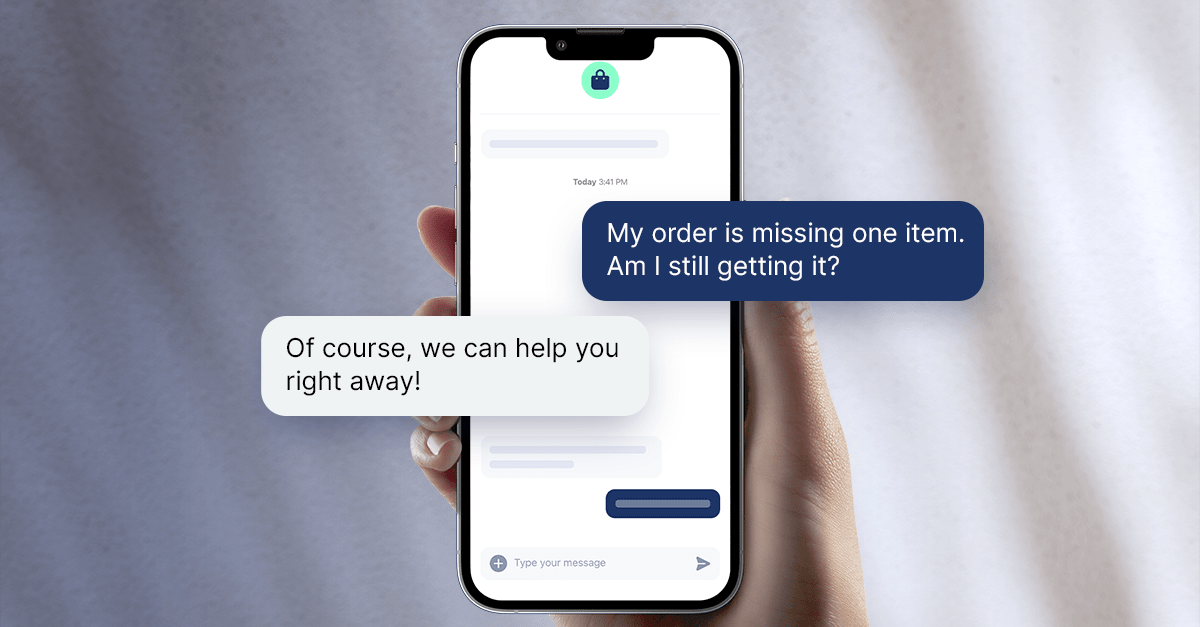How often do you talk to your customers in real-time? Playing email tag or seeing customer comments pile up on social media frustrates customers and support agents alike. It drags out conversations, delays customer solutions, and puts undue stress on your team.
With the rise of digital technology, businesses have a plethora of options for connecting with customers. But nothing compares to the immediacy and personal touch of real-time support.
Whether through live chat (also known as web chat), phone support, or social media, customers prefer (and often expect) immediate responses. In fact, Zendesk’s 2022 CX Trends Report found that 76% of customers say they expect to engage with someone immediately when contacting a company.
In this article, we’ll explore the benefits of real-time customer support and share tips to help you deliver it effectively.
Benefit #1: Increased customer satisfaction.
It’s no secret that modern customers expect immediacy, from same-day shipping to instant test results. The same goes for customer service. When customers have a problem or question, there’s no substitute for real-time conversations.
Here are a few ways real-time support increases customer satisfaction:
Customers get quick solutions.
Waiting 1–3 business days for an answer to a simple question is frustrating. What if a customer is buying airline tickets as a last-minute holiday gift, but they’re not sure if the tickets are transferable? Customers aren’t going to wait for an emailed response. They’re just going to go elsewhere.
Complex solutions get solved in one interaction.
Complex problems can drag out over asynchronous communications. From explaining the problem, finding a solution, and follow-up questions, it can take days for a customer problem to get resolved. Real-time support lets customers ask questions, test your solutions, and ensure they get their problems solved in just one interaction.
It’s easier to make connections in real time.
Making connections with asynchronous messaging is absolutely possible, but it’s easier to do over real-time online communication (and phone). A conversational cadence is essential when building rapport, and it’s easier to judge a customer’s mood when basing it on real-time information.
Benefit #2: Boost sales and customer retention.
There’s no denying that satisfied customers are more likely to buy from you again. Customer service has a big impact on buying decisions, whether it’s great customer service or bad customer service.
According to Zendesk, 61% of customers will defect to a competitor after just one bad experience—and 76% of customers are out the door after two. We don’t just underestimate the impact bad customer service has on sales. We also underestimate just have valuable good customer service is. Zendesk also found that 90% of customers will spend more with companies that personalize customer service.
Benefit #3: Enhanced reputation.
Real-time customer service can also help prevent negative reviews. When customers have an issue with a product or service, a quick response from your support team can turn a bad experience into a good one.
Your customer service itself can also have a big impact on your business reputation. Consider highly unpopular cable companies (that shall not be named). Their poor customer service, which includes long hold times and an unwillingness to value existing customers over new ones, was only tolerated because there were few options available. Now, more customers are cutting the cord and avoiding having to deal with cable companies altogether.
Embracing real-time support—and doing it well—improves your reputation and makes it easier for customers to choose to do business with you.
Benefit #4: Gain a competitive advantage.
In our increasingly digital world, it’s getting harder for customers to differentiate businesses from their competitors. Price and convenience are often the deciding factors for customers. But delivering outstanding customer service in real time can make you stand apart from the competition.
You’ll give customers peace of mind knowing that your team is available to answer questions as soon as they come up. There’s no waiting, back-and-forth, or fruitless searching for information. You’re there when customers need you.
5 tips for enhancing real-time support.
Implementing real-time customer service is a big task, and going from zero to 60 is a lot to ask of your team. Start slowly, and use these tips to enhance your live support as you go.
Prepare support agents for real-time conversations.
Making the switch from email conversations to real-time support can be intimidating for your customer service team. They’ll be expected to quickly assess situations and provide solid solutions.
Spend a little more time training agents in conflict resolution, empathy, and improvisation. They’ll be better prepared than simply memorizing product knowledge.
Contextualize interactions.
Real-time customer support, whether online or over the phone, brings some unique challenges—mainly, getting customers the right information at the right time. In order to personalize the conversation and provide unique solutions to customer problems, your support agents need easy access to information.
From customer data like previous purchases and support history to product information, support agents need to be able to gather information quickly. Ensure they have a customer relationship management system or conversational platform they can pull from to solve unique customer problems on the first interaction.
Implement live chat on your website.
The key to real-time online communication is making it easy and accessible. While phone support is a good option for traditional businesses, there are many barriers that can prevent customers from having a good experience. Long wait times, a lack of visuals, or even social anxiety can make customers avoid phone conversations altogether.
Adding live chat software to your website with a communications platform is the best way to get started. Customers can reach out for immediate support whenever they’re having difficulties, and they won’t have to wait on hold.
Provide agents with the right tools.
Look for phone and web chat software with robust features to help your agents succeed. Quiq provides features like sentiment analysis and AI-powered text prediction to help agents with real-time online communication.
Customers get fast answers to their questions, and agents feel better prepared to answer complex questions on the fly.
Consider chatbots to support your team.
Offering real-time customer support means you have to make a few important decisions. Are you going to hire agents around the clock to provide 24/7 service? Will you set real-time service to business hours? What will you do during peak service seasons?
A great option to support your team, without making them work 24/7, is to add chatbots into your agent mix. Chatbots can help answer simple questions while your customer service agents are unavailable. They can even help agents be more efficient by collecting customer information upfront.
Collect customer feedback.
The best way to make live chat work for your customers is to continuously ask them how to improve it. Send surveys immediately after conversations to help you assess how your customer service agents are performing, what you can do to make it better, and how you can better personalize the experience for each customer.
Real-time support is the way to go.
Real-time support is a crucial component of your overall customer experience. There’s a place for asynchronous communication—but it takes a healthy mix of that and real-time support to serve your customers. By following best practices and continuously looking for ways to improve, you can ensure your team is providing top-notch, real-time service to your customers.




